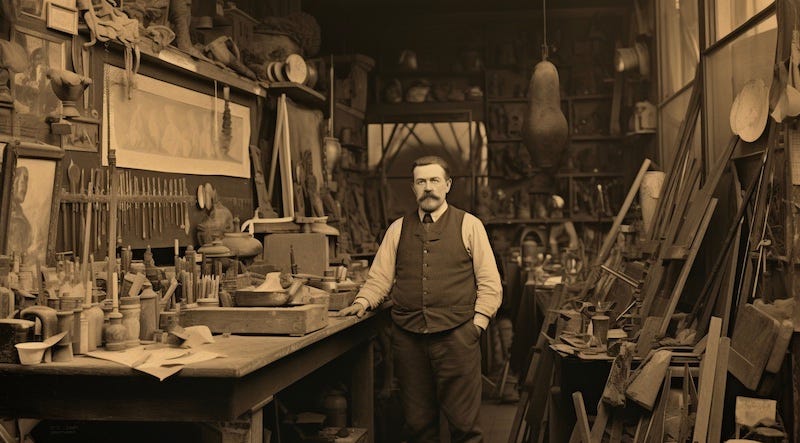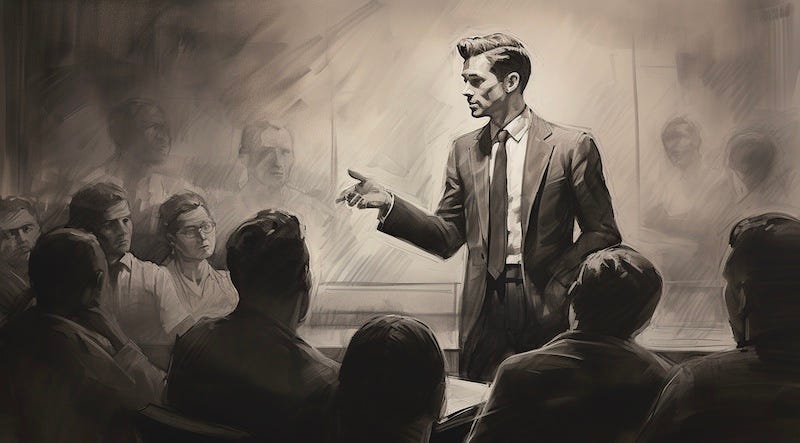240. The Dangerous Downside Of Storytelling in Leadership
Storytelling plays an important role in humanity as it does in the workplace. But sometimes it's just plain toxic. Successful leadership knows the difference.
You probably have never heard of John Greene Chandler. He doesn’t even have a Wikipedia page, for goodness’ sake.
John was an artist, woodcarver, and lithographer in the 1800s. It’s safe to say he wasn’t a leader in any of his trades. In fact, during his peak years, he was mostly known for making paper dolls.
I can imagine the conversation down at the local pub as the fellas listened to Chandler boast about how the new lithography project he got was the one that’d turn things around for him and the missus.
“Sure it will, Johnny-boy. Sure it will. Maybe just don’t quit your paper doll job quite yet,” they’d respond between hearty laughs and heartier swigs of ale.
Needless to say, his work was all but forgotten.
All except for one piece.
To my knowledge, John Chandler published only one book in his entire life. But it is still talked about to this day.
It was called “The Remarkable History of Chicken Little.”
The book didn’t make many waves back then, but the fable has been passed down through generations and gained in worldwide popularity.
In fact, it’s practically become a standard in children’s fables, up there alongside such classics as “The Tortoise and the Hare”, “The Boy Who Cried Wolf” and “The Daughter Who Wouldn’t Stop Singing One Line of a Song Over and Over Until Her Parents Went Bonkerballs”
(Editors Note: Disregard that last one. It’s complicated.)
The Remarkable History of Chicken Little
The story of Chicken Little goes something like this:
The little chicken is hanging out in the forest when he gets hit in the head by a falling acorn. Ever the alarmist, Chicken Little takes it as a precursor that the sky is falling. Naturally, he waddles quickly to warn the King.
On the way to said King, the chicken meets many feathered friends and convinces each of them that the sky is falling and that he has proof. He successfully alarms others and they all widdle-waddle as one, on their way to warn the King.
They eventually encounter a fox, who feigns alarm and promises to get them a meeting with the King. However, the birds are instead lured into the fox’s den where, in a horrendously brutal turn of events, he eats them all.
The Importance of Storytelling in Leadership
Storytelling is an essential part of being human. People are drawn to stories to help them make sense of the world.
Stories are essential in explaining information, creating emotional connections, and transferring information across generations.
Of the many insightful things said by the sometimes-crazy Steve Jobs, he had great insight into storytelling and leadership.
“The most powerful person in the world is the storyteller. The storyteller sets the vision, values and agenda of an entire generation that is to come.”
That’s the healthy part of storytelling and leadership.
But that’s not the part I am here to talk about today.
Remember, Chicken Little was eaten alive in the end.
If you haven’t figured it out yet, Tonto, this article isn’t about the good part of storytelling.
Yes, storytelling is about relaying information. But when information is missing, that’s when the stories get sucked down a funneling abyss of despair. And that’s when things get a wee bit wonky for leadership.
When Storytelling gets Catastrophic
In the absence of data, we will always make up our own stories.
Read that again. It’s important. Here you go:
In the absence of data, we will always make up our own stories.
And when you’re in the workplace, it can turn toxic.
—
Catastrophizing is when you believe you’re in a worse situation than you actually are. It is one of the most unhealthy types of storytelling at work, whether you’re leadership or not.
When running late for a meeting causes you to stress that you’re going to be fired and won’t get a new job and will die sad and lonely with a bad bowl cut - that’s catastrophizing.
When you encounter a minor setback at work and feel like the entire project is going to collapse like a Jenga tower - that’s catastrophizing too.
<cue falling acorn>
Because of our seemingly innate tendency towards storytelling, our emotions can extrapolate a saga of self-destruction when our story starts with only a piece of the information.
Do you ever catastrophize? If not, I’m sure you at least know one person who does.
But wait, it gets more complicated.
Storytelling Without the Facts
Sometimes we tell stories to ourselves that we want to believe but can’t quite prove true. So we construct our chronicle from a lack of information and then search for the evidence to prove it correct.
I was coaching a leader recently who would tell me about the evil head of marketing. I’d ask why the person was evil, but would rarely get a clear answer. Yet every time we got on a call, I’d be given more “proof” to justify the evilness of the marketing lead.
“I heard she yelled at her staff member and made them cry,” I’d be told.
(Editor’s Note: #hearsay)
“She deliberately held information from me when she should’ve told me,” she’d say
(Editors Note: #unproven)
These types of stories happen all the time at companies - oftentimes without us recognizing it. And they are as unhealthy as eating a raw chunk of chicken.
I encounter many leaders who do this - they pass judgment on others and search for evidence to justify their claims.
Successful leadership, however, is about understanding the difference between healthy storytelling and toxic.
The most successful leaders I’ve worked with are the ones who dig into their inner ugly and explore the reasons why they’re telling these stories to themselves.
I teach them about the five whys (read this).
When you are constructing stories that lead to despair, it is crucial to ask yourself why the story matters. Then keep peeling back the layers of “why?” until you reach the core truth.
Why do you have the impression of the marketing leader?
Why does that impression bother you?
Why are you threatened by that feeling?
I teach the Five Whys to my coaching and consulting clients and, hot diggity if there isn’t a surprising and immediate breakthrough every time. Their attitude and behavior change overnight from toxic storytelling to positivity and growth.
As for you, just remember, the sky isn’t falling.
It’s only an acorn.
Somewhat Relevant Quote
“Imagine a new story for your life and start living it.”
Paulo Coelho - novelist, inspiringly cool guy
Random News
Building Blind - Lego created braille bricks
Hero or Idiot? - A funny thing happened at the lakeside bbq
Corpse Pose - When your yoga pose becomes real
Flushed - The toilet bowl industry has just been disrupted
As a free bonus this week, here’s a picture of a puppy. You’re welcome.








Hi Jeff: Nice post! An interesting twist on the flip side (darker) of storytelling. I also think we can get caught up chasing or mimicking other peoples’ or other organizations’ stories and lose sight of what we can uniquely offer.